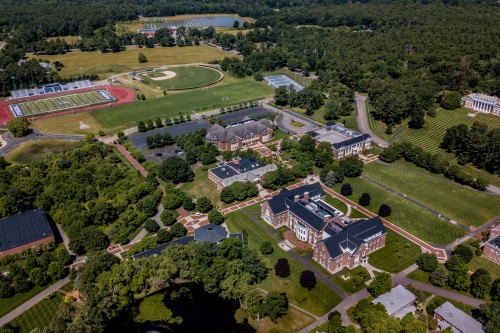Creating Sea Change
Faculty member receives grant in support of project to examine marine debris.
As people head to the beach this summer to enjoy a little fun in the sun, Kristin Burkholder, associate professor of environmental science, is doing her part to keep our oceans clean.
Alongside staff from the Massachusetts Institute of Technology Sea Grant and the Cohasset Center for Student Coastal Research, the faculty member is leading a project designed to explore the sources and ecological impact of marine debris. This initiative is supported by a $286,284 award from the National Oceanic and Atmospheric Administration (NOAA) Sea Grant.
“My partners and I are thrilled to receive this grant, especially in light of how competitive this year’s application pool was,” Burkholder said. “NOAA’s support will go a long way in helping us complete this important work, which we hope will benefit many.”
Burkholder and her collaborators will oversee a coalition comprised of K-12 educators and students, environmental organizations, and commercial fishermen. Together, they will seek to build tools that track and visualize debris. Specifically, they hope to enhance the design of ocean drifters, low-cost units that look like unanchored buoys and use satellites to determine oceanic movement. Once these updated drifters are produced, representatives from the Gulf of Maine Lobster Foundation will coordinate with commercial fishermen to take them offshore and launch them.
“We want to figure out how to make the drifters more sustainable and how to ensure they aren’t adding more debris to the ocean,” Burkholder said. “Furthermore, we want to think about how we can design them to mimic different types of debris so we can better understand how different items move through the water.”
The project’s leaders will also work with K-12 teachers to develop curricula focused on oceanography. These educators will visit Stonehill to participate in workshops that will enable them to talk to their students about marine debris. They will learn how to use various instruments that will assist them in these lessons.
Additionally, the team plans to create an internship pathways program for underrepresented youth interested in tackling issues related to marine debris. They will provide funds to help students address the barriers that may prevent them from interning.
“We know that a lot of environmental science internships are difficult to access for students at the high school level,” Burkholder said. “Part of that is geographic, as field sites are sometimes located far from cities. Other times, barriers are financial, as many opportunities are unpaid. We hope that a program like this can help broaden the community that is exploring the impact of marine debris.”
As all this work begins taking shape, Burkholder hopes she can get members of the Stonehill community involved with this initiative as well.
“I have long used drifter data in my work with Stonehill students,” she said. “This program offers them a unique opportunity to continue participating by addressing issues affecting our own oceanic backyard.”


